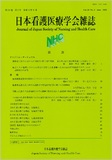Japanese
English
- 有料閲覧
- Abstract 文献概要
- 参考文献 Reference
要旨
目的:本研究の目的は、高齢入院患者に対し、看護師が実践している食事場面における誤嚥予防を目指した臨床判断によるケアの特徴を明らかにすることである。
方法:臨床経験5年以上の看護師10名に、食事場面で実施した誤嚥予防のケア内容、ケア実施に至った判断理由とその根拠となった情報について半構造化インタビューを行い、質的記述的研究法を用いて分析した。
結果:食事場面における誤嚥予防を目指した臨床判断によるケアは、食事前は、【覚醒状態で摂食の可否を判断】【安定した摂食姿勢に調整】など4分類、食事中は、【咽頭残留を考慮した摂食方法を選択】【誤嚥徴候の観察】など10分類、食事後は、【咽頭残留を除去し咽頭環境を改善】【胃食道逆流を防止する姿勢に調整】など3分類に分類された。
結論:看護師は、食事前に覚醒状態で摂食の可否を判断していた。食事中は、一口量や摂食ペースが嚥下機能に適しているかを判断し、誤嚥のリスクを予測して、対策を講じた上で食事介助をしていた。また、食事後は、口腔と咽頭内の食物残渣による誤嚥を回避し、姿勢調整で胃食道逆流を予防していた。
Objective: The purpose of this study was to identify the characteristics of nurses' clinical judgment-based care for preventing aspiration in dietary assistance, as practiced by nurses for older inpatients.
Method: Semi-structured interviews were conducted with ten nurses who had greater than five years of clinical experience. The content of the interview was based on official procedural instructions for aspiration prevention when helping patients at mealtimes. The instructions also included the rationale for providing support for patients. Data were analyzed using qualitative descriptive research methods.
Results: Clinical judgment-based care aims at preventing aspiration in dietary assistance. Before the meals, there were 4 care classifications, including [determine feeding in the awake state] and [adjusting a stable posture]. During the meals, there were 10 care classifications, including [choosing a method of swallowing without pharyngeal residue] and [observation of aspiration signs]. After the meals there were 3 care classifications, including [removing pharyngeal residue and improving the pharyngeal environment] and [adjusting posture to prevent gastroesophageal reflux].
Conclusion: The nurses judged the availability of food based on the level of arousal before the meals. During the meals, they judged whether the number of bites and the pace of eating were appropriate for their swallowing function. Then, the risk of aspiration was predicted, and countermeasures were taken before dietary assistance. After the meals, aspiration due to food residue in the oral cavity and pharynx was prevented, and gastroesophageal reflux was prevented by postural adjustments.
Copyright © 2022, Japan Society of Nursing and Health Care All rights reserved.


